The secrecy and deceit surrounding U.S. war crimes has had catastrophic consequences in this century, writes James Bovard.

With her brother on her back a war-weary Korean girl passes a stalled M-26 tank in Haengju, Korea, June 9, 1951. (U.S. Army, Maj. R.V. Spencer)
By James Bovard
JimBovard.com
 This year is the 70th anniversary of the start of the Korean War, a conflict from which Washington policymakers learned nothing. Almost 40,000 American soldiers died in that conflict, which should have permanently vaccinated the nation against the folly and evil of foreign intervention. Instead, the war was retroactively redefined. As President Barack Obama declared in 2013, “That war was no tie. Korea was a victory.”
This year is the 70th anniversary of the start of the Korean War, a conflict from which Washington policymakers learned nothing. Almost 40,000 American soldiers died in that conflict, which should have permanently vaccinated the nation against the folly and evil of foreign intervention. Instead, the war was retroactively redefined. As President Barack Obama declared in 2013, “That war was no tie. Korea was a victory.”
The war began with what President Harry Truman claimed was a surprise invasion on June 25, 1950, by the North Korean army across the dividing line with South Korea that was devised after World War II. But the U.S. government had ample warnings of the pending invasion. According to the late Justin Raimondo, founder of antiwar.com, the conflict actually started with a series of attacks by South Korean forces, aided by the U.S. military:
“From 1945-1948, American forces aided [South Korean President Syngman] Rhee in a killing spree that claimed tens of thousands of victims: the counterinsurgency campaign took a high toll in Kwangju, and on the island of Cheju-do — where as many as 60,000 people were murdered by Rhee’s US-backed forces.”
The North Korean army quickly routed both South Korean and U.S. forces. A complete debacle was averted after Gen. Douglas MacArthur masterminded a landing of U.S. troops at Inchon. After he routed the North Korean forces, MacArthur was determined to continue pushing northward regardless of the danger of provoking a much broader war.
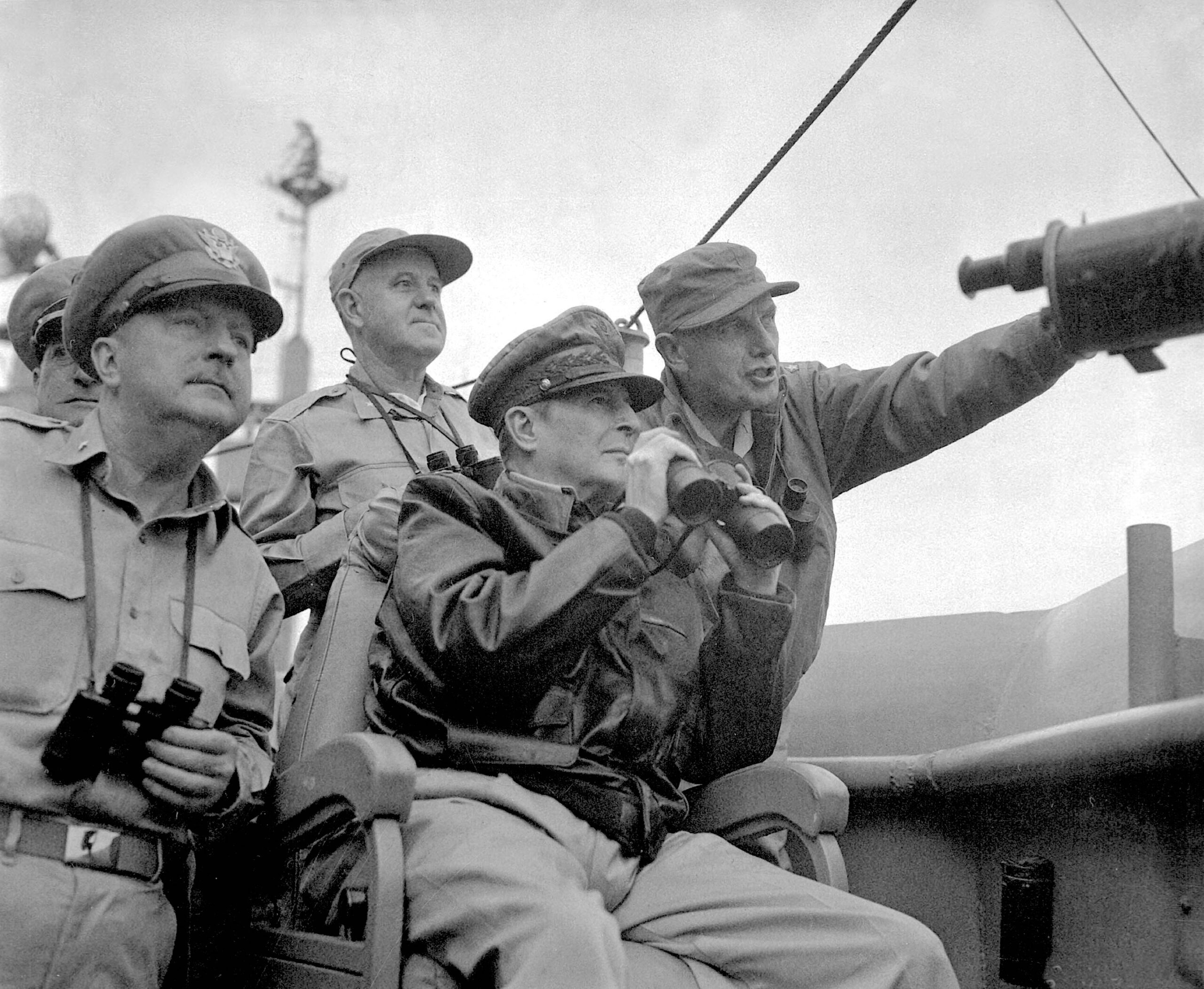
Brigadier General Courtney Whitney (left), General of the Army Douglas MacArthur (seated) and Major General Edward Almond (right) observe the shelling of Inchon from the USS Mount McKinley. (U.S. Army, Nutter, Wikimedia Commons)
By the time the U.S. forces drove the North Korean army back across the border between the two Koreas, roughly 5,000 American troops had been killed. The Pentagon had plenty of warning that the Chinese would intervene if the U.S. Army pushed too close to the Chinese border. But the euphoria that erupted after Inchon blew away all common sense and drowned out the military voices who warned of a catastrophe. One U.S. Army colonel responded to a briefing on the Korea situation in Tokyo in 1950 by storming out and declaring, “They’re living in a goddamn dream land.”
The Chinese military attack resulted in the longest retreat in the history of America’s armed forces — a debacle that was valorized by allusion in the 1986 Clint Eastwood movie, Heartbreak Ridge. By 1951, the Korean War had become intensely unpopular in the United States — more unpopular than the Vietnam War ever was. At least the war, which President Harry Truman insisted on mislabeling as a “police action,” destroyed the presidency of the man who launched it. By the time a ceasefire was signed in mid 1953, almost 40,000 Americans had been killed in a conflict that ended with borders similar to those at the start of the war.
Disasters
Perhaps the biggest disaster of the Korean war was that intellectuals and foreign-policy experts succeeded in redefining the Korean conflict as an American victory. As Georgetown University professor Derek Leebaert noted in his book Magic and Mayhem, “What had been regarded as a bloody stalemate transformed itself in Washington’s eyes; ten years later it had become an example of a successful limited war. Already by the mid-1950s, elite opinion began to surmise that it had been a victory.” Leebaert explained, “Images of victory in Korea shaped the decision to escalate in 1964-65 helping to explain why America pursued a war of attrition.”
Even worse, the notion that “‘America has never lost a war’ remained part of the national myth, and the notion of having ‘prevailed’ in Korea became a justification for going big in Vietnam.” But as Leebaert noted, “in Vietnam, [the U.S. Army] had forgotten everything it had learned about counterinsurgency in Korea as well.”
When the American media noted the 70th anniversary of the start of the war this past June, they paid little or no attention to the war’s dark side. The media ignored perhaps the war’s most important lesson: the U.S. government has almost unlimited sway to hide its own war crimes.
During the Korean War, Americans were deluged with official pronouncements that the U.S. military was taking all possible steps to protect innocent civilians. Because the evils of communism were self-evident, few questions arose about how the United States was thwarting Red aggression. When a U.S. Senate subcommittee appointed in 1953 by Sen. Joseph McCarthy investigated Korean War atrocities, the committee explicitly declared that “war crimes were defined as those acts committed by enemy nations.”
In 1999, 46 years after the cease fire in Korea, the Associated Press exposed a 1950 massacre of Korean refugees at No Gun Ri. U.S. troops drove Koreans out of their village and forced them to remain on a railroad embankment. Beginning on July 25, 1950, the refugees were strafed by U.S. planes and machine guns over the following three days. Hundreds of people, mostly women and children, were killed. The 1999 AP story was widely denounced by American politicians and some media outlets as a slander on American troops.
The Pentagon promised an exhaustive investigation. In January 2001, the Pentagon released a 300-page report purporting to prove that the No Gun Ri killings were merely “an unfortunate tragedy” caused by trigger-happy soldiers frightened by approaching refugees.
President Bill Clinton announced his “regret that Korean civilians lost their lives at No Gun Ri.” In an interview, he was asked why he used “regret” instead of “apology.” He declared, “I believe that the people who looked into it could not conclude that there was a deliberate act, decided at a high-enough level in the military hierarchy, to acknowledge that, in effect, the Government had participated in something that was terrible.” Clinton specified that there was no evidence of “wrongdoing high-enough in the chain of command in the Army to say that, in effect, the Government was responsible.”
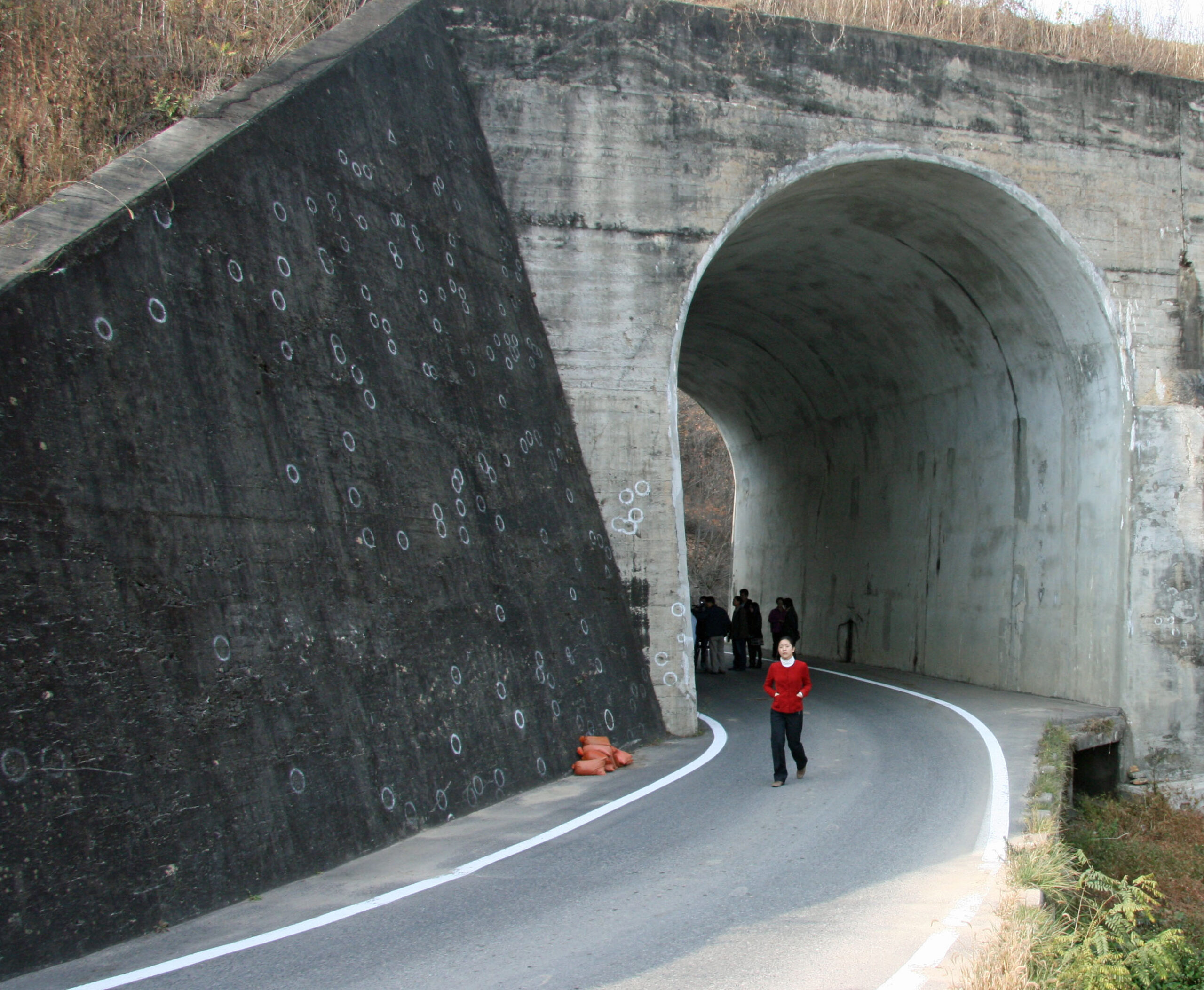
2008 photo showing concrete abutment outside the No Gun Ri bridge, where investigators’ white paint identifies bullet marks and embedded fragments from U.S. Army gunfire in the 1950 shooting of South Korean refugees. (Cjthanley, CC BY-SA 3.0, Wikimedia Commons)
But the atrocities against civilians had been common knowledge among U.S. troops 50 years earlier. As Charles Hanley, Sang-Hun Choe and Martha Mendoza noted in their 2001 book, The Bridge at No Gun Ri, the Pentagon in 1952 “withdrew official endorsement from RKO’s One Minute to Zero, a Korean War movie in which an Army colonel played by actor Robert Mitchum orders artillery fire on a column of refugees.” The Pentagon fretted that “this sequence could be utilized for anti-American propaganda” and banned the film from being shown on U.S. military bases.
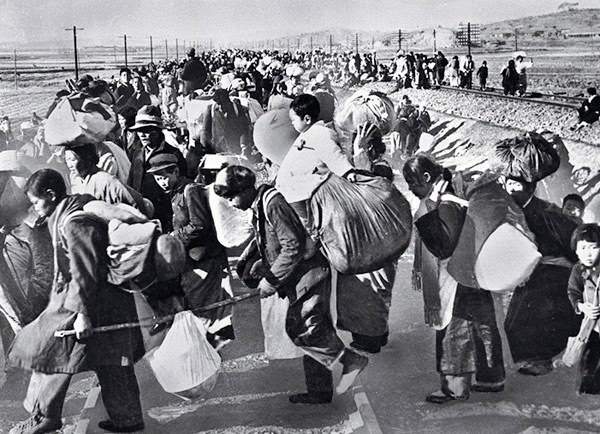
South Koreans fleeing south in mid-1950 after the North Korean army invaded. (U.S. Defense Department, Wikimedia Commons)
In 2005, Sahr Conway-Lanz, a Harvard University doctoral student, discovered a letter in the National Archives from the U.S. ambassador to Korea, John Muccio, sent to Assistant Secretary of State Dean Rusk on the day the No Gun Ri massacre commenced. Muccio summarized a new policy from a meeting between U.S. military and South Korean officials: “If refugees do appear from north of U.S. lines they will receive warning shots, and if they then persist in advancing they will be shot.” The new policy was radioed to Army units around Korea on the morning the No Gun Ri massacre began. The U.S. military feared that North Korean troops might be hiding amidst the refugees. The Pentagon initially claimed that its investigators never saw Muccio’s letter but it was in the specific research file used for its report.
Slaughtering Civilians
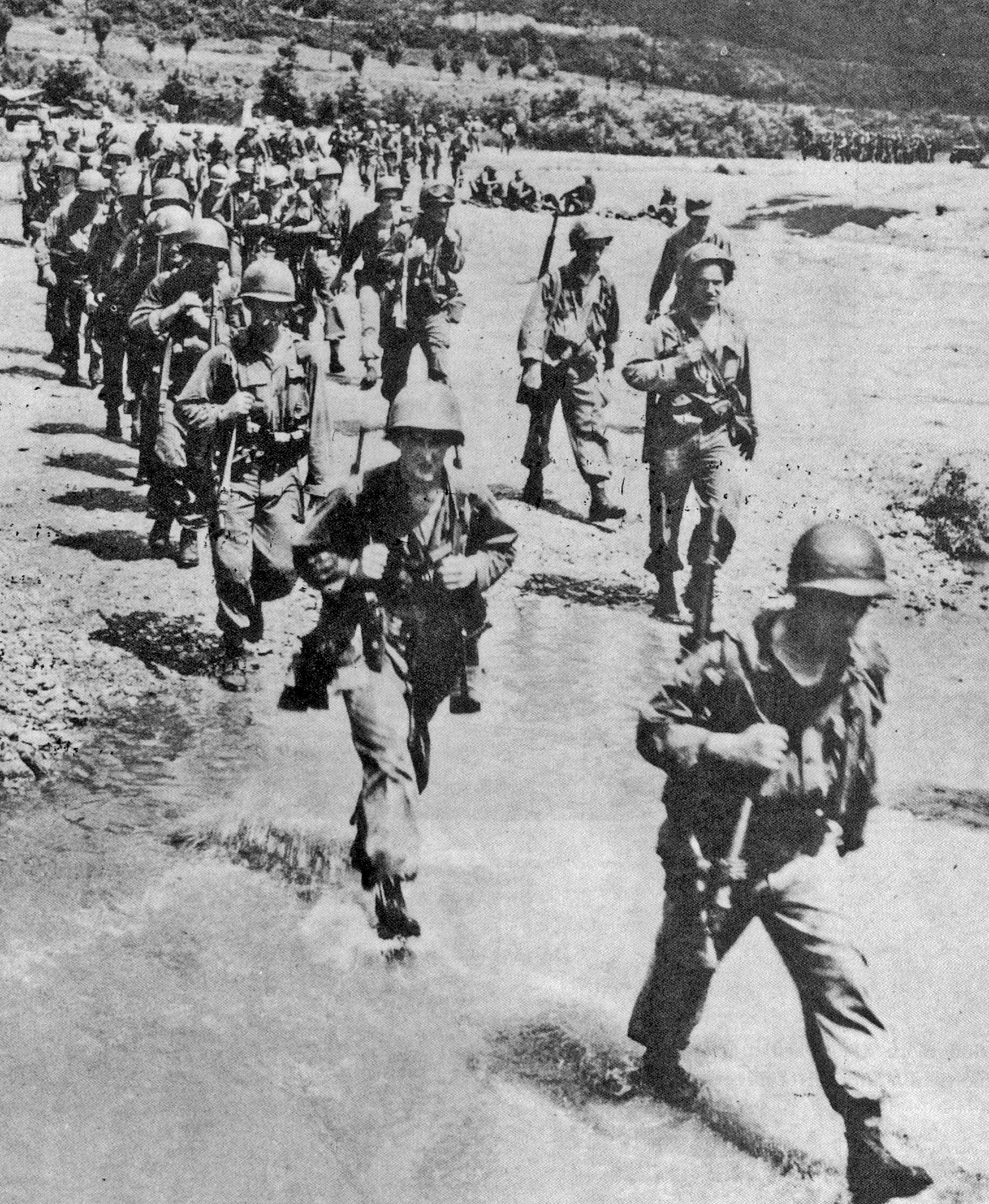
Unidentified unit of 1st Cavalry Division withdraws southward, July 29, 1950, the day a division battalion pulled back from No Gun Ri after killing large numbers of trapped South Korean refugees there. (U.S. Army, Wikimedia Commons)
Conway-Lanz’s 2006 book Collateral Damage: Americans, Noncombatant Immunity, and Atrocity after World War II quoted an official U.S. Navy history of the first six months of the Korean War stating that the policy of strafing civilians was “wholly defensible.” An official Army history noted, “Eventually, it was decided to shoot anyone who moved at night.” A report for the aircraft carrier USS Valley Forge justified attacking civilians because the Army insisted that “groups of more than eight to ten people were to be considered troops, and were to be attacked.”
In 2007, the Army recited its original denial: “No policy purporting to authorize soldiers to shoot refugees was ever promulgated to soldiers in the field.” But the Associated Press exposed more dirt from the U.S. archives: “More than a dozen documents — in which high-ranking U.S. officers tell troops that refugees are ‘fair game,’ for example, and order them to ‘shoot all refugees coming across river’ — were found by the AP in the investigators’ own archived files after the 2001 inquiry. None of those documents was disclosed in the Army’s 300-page public report.” A former Air Force pilot told investigators that his plane and three others strafed refugees at the same time of the No Gun Ri massacre; the official report claimed that “all pilots interviewed … knew nothing about such orders.” Evidence also surfaced of massacres like No Gun Ri. On Sept. 1, 1950, the destroyer USS DeHaven, at the Army’s insistence, “fired on a seaside refugee encampment at Pohang, South Korea. Survivors say 100 to 200 people were killed.”
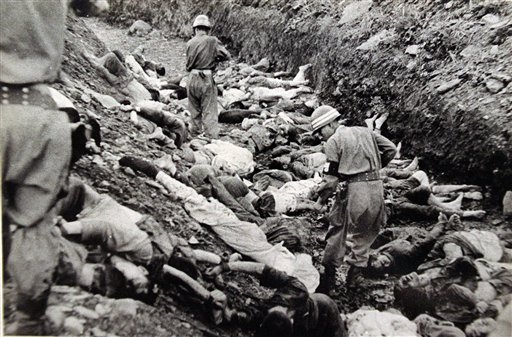
In this July 1950 U.S. Army file photograph once classified “top secret,” South Korean soldiers walk among some of the thousands of South Korean political prisoners shot at Taejon, South Korea, early in the Korean War. (Major Abbott/U.S. Army, Wikimedia Commons)
Slaughtering civilians en masse became routine procedure after the Chinese army intervened in the Korean war in late 1950. MacArthur spoke of turning North Korean-held territory into a “desert.” The U.S. military eventually “expanded its definition of a military target to any structure that could shelter enemy troops or supplies.” Gen. Curtis LeMay summarized the achievements: “We burned down every town in North Korea … and some in South Korea, too.” A million civilians may have been killed during the war. A South Korean government Truth and Reconciliation Commission uncovered many previously unreported atrocities and concluded that “American troops killed groups of South Korean civilians on 138 separate occasions during the Korean War,” The New York Times reported.
Truth delayed is truth defused. The Pentagon strategy on Korean War atrocities succeeded because it left facts to the historians, not the policymakers. The truth about No Gun Ri finally slipped out — 10 presidencies later. Even more damaging, the Rules of Engagement for killing Korean civilians were covered up for four more U.S. wars. If U.S. policy for slaying Korean refugees had been exposed during that war, it might have curtailed similar killings in Vietnam (many of which were not revealed until decades after the war).
Former congressman and decorated Korean War veteran Pete McCloskey (R-Calif.) warned, “The government will always lie about embarrassing matters.”
The same shenanigans permeate other U.S. wars. The secrecy and deceit surrounding U.S. warring has had catastrophic consequences in this century. The Bush administration exploited the 9/11 attacks to justify attacking Iraq in 2003, and it was not until 2016 that the U.S. government revealed documents exposing the Saudi government’s role in financing the 9/11 hijackers (15 of 19 whom were Saudi citizens). The Pentagon covered up the vast majority of U.S. killings of Iraqi civilians until Bradley Manning and WikiLeaks exposed them in 2010. There are very likely reams of evidence of duplicity and intentional slaughter of civilians in U.S. government files on its endlessly confused and contradictory Syrian intervention.
When politicians or generals appear itching to pull the United States into another foreign war, remember that truth is routinely the first casualty. It is naive to expect a government that recklessly slays masses of civilians to honestly investigate itself and announce its guilt to the world. Self-government is a mirage if Americans do not receive enough information to judge killings committed in their name.
James Bovard is a policy adviser to The Future of Freedom Foundation. He is a USA Today columnist and has written for The New York Times, The Wall Street Journal, The Washington Post, New Republic, Reader’s Digest, Playboy, American Spectator, Investors Business Daily, and many other publications. He is the author of Freedom Frauds: Hard Lessons in American Liberty (2017, published by FFF); Public Policy Hooligan (2012); Attention Deficit Democracy (2006); The Bush Betrayal (2004); Terrorism and Tyranny (2003); Feeling Your Pain (2000); Freedom in Chains (1999); Shakedown (1995); Lost Rights (1994); The Fair Trade Fraud (1991); and The Farm Fiasco (1989). He was the 1995 co-recipient of the Thomas Szasz Award for Civil Liberties work, awarded by the Center for Independent Thought, and the recipient of the 1996 Freedom Fund Award from the Firearms Civil Rights Defense Fund of the National Rifle Association. His book Lost Rights received the Mencken Award as Book of the Year from the Free Press Association. His Terrorism and Tyranny won Laissez Faire Book’s Lysander Spooner award for the Best Book on Liberty in 2003. Read his blog. Send him email.
This article was originally published in the September 2020 edition of Future of Freedom and on the author’s blog and is reprinted with the his permission.
The views expressed are solely those of the author and may or may not reflect those of Consortium News.
Please Contribute to Consortium News
Donate securely with
Click on ‘Return to PayPal’ here.
Or securely by credit card or check by clicking the red button:



The lesson to learn here is “government lies” and keep that in mind every day until the NEXT election and not let any government statement or message be internalized before lengthy evaluation takes place. In addition, when we discern an issue,, a violation of “the truth” we must communicate that concern to family, friends, neighbors to our representatives, alert any organizations we affiliate with. There is a way to heighten awareness in others before they establish a “belief” that makes a mutual dialog difficult. Now is the time to learn or re-learn skills in communication ……..not two months before election. Actually, that is what I am trying to practice right now. If nothing else, even if I fail to influence one person…I have helped myself put my mind in order. North and South Korea have dwelt heavily in my mind for many years……if the Truth ( which I have heard over the years in tiny bits and pieces ) will finally live in the open……I can be there to support it.
Very well-written and informative article.
Anyone who claims that the US government is a force for good should be required to read and respond to this article, in public.
AFTER READING THE WAR CRIMES IN THE ARTICLE ON THE KOREAN WARS , THE SECRECY SURROUNDING THE CRIMES IN ALL WARS IS THE SHAME ON THE POLITICIANS AT TOP OF GOVERNMENTS. THE ONES WHO DID THE KILLINGS ON OREDER FROM THEIR COMMANDERS ARE WHO TRUMP CALLED LOSERS AND SUCKERS. JULIAN ASSANGE HAS ONCOVERED THE WAR CRIMES AND SHOULD BE APPLAUDED ,LIKE THOSE REPORTERS WHO UNCOVERED THE SECRECY. PAST INHUMANITY HA TO BE AGKNOWLEGED BY CURRENT HOLDERS OF POWER. WHY HAS”NT ANYONE DONE THIS .HE OR SHE DOES NOT THINK WAR CRIMES SHOULD CEASE OR ARE INHUMAN. ??? NO WONDER WE VIEW ALL POLITICIANS ARE HYPOCRITES
And we’ve gotta lotta damn gall claiming to be leading a rules based international order and that we are a shining beacon on the hill. The rest of the world knows our claims are BS. Eventually, they will make us pay for it. As I’ve said, we are the most powerful nation on earth but we are not more powerful than the rest of the world.
A truly excellent and informative piece.
I knew about the No Gun Ri massacre by American troops, but the author has added additional events around that specific one.
And we should remember the Pentagon’s estimate of the dead from three years of American carpet bombing of the North, one-fifth of the entire population of North Korea.
I think it safe to say, there is never war without war crimes, so why does the US keep starting wars?
And why does it keep lying about all of them, their causes and results?
A legacy of mass killing and lies, always covered up with Patriotic jingoism.
The new genocide on our own species is not actually new, either. Germ~biowarfare since the beginning of barbarism has and is a choice to commit mass / individual murder/s. Until human life forms get that human is not a separation from being human, devolution is to continue.
…”genocide on our own species is not actually new”…yes, sadly….
You also remind me, Lynne, that for all the excuses and lies and rewriting of history papering over this madness our species mindlessly acts like vicious predator ants….rampaging and murdering a target colony of ants to subjugate the victims….
Our national security state lies with impunity using the secrecy we oblige them. And for what? So they can hide the wrongdoing and failures behind the undeserving trust we freely offer…
We pay for it….and the suffering goes on…